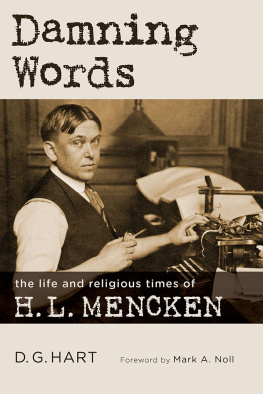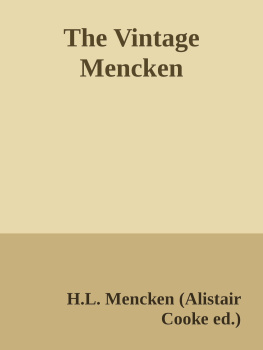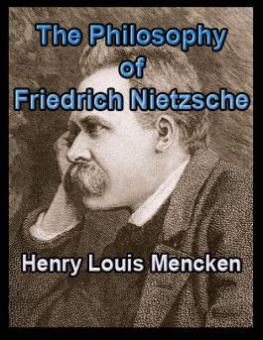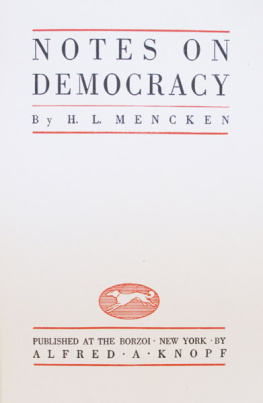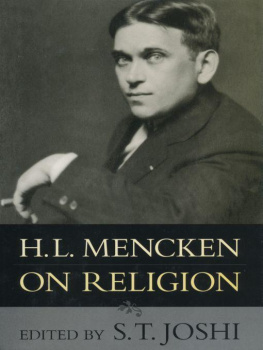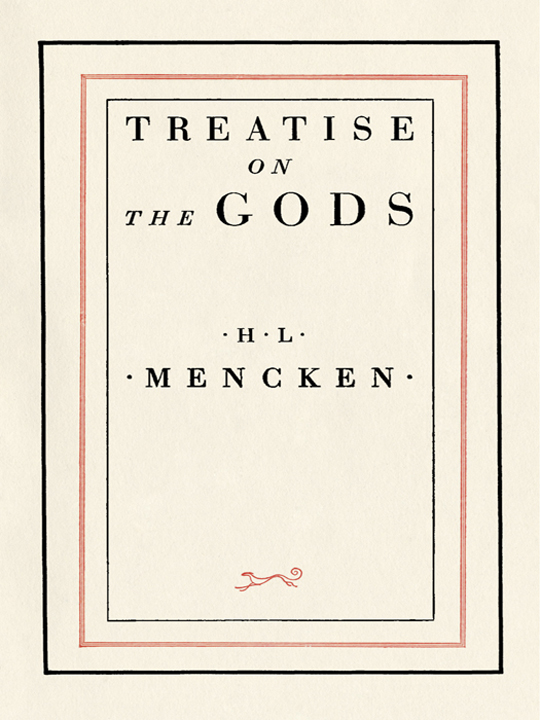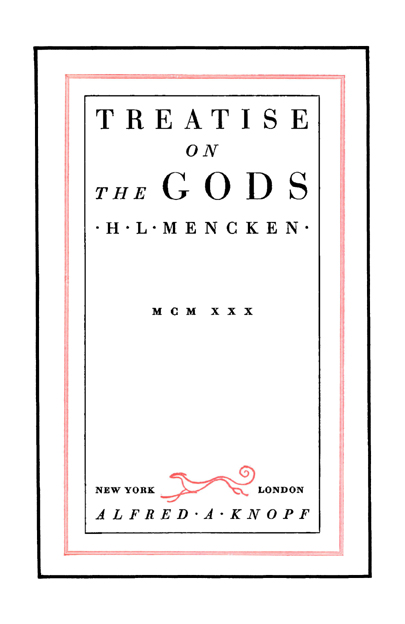H L MENCKEN
PREJUDICES: FIRST SERIES
PREJUDICES: SECOND SERIES
PREJUDICES: THIRD SERIES
PREJUDICES: FOURTH SERIES
PREJUDICES: FIFTH SERIES
PREJUDICES: SIXTH SERIES
SELECTED PREJUDICES A BOOK OF BURLESQUES
A BOOK OF PREFACES IN DEFENSE OF WOMEN
THE AMERICAN LANGUAGE NOTES ON DEMOCRACY
TREATISE ON THE GODS
Translation
THE ANTICHRIST, BY F. W. NIETZSCHE
ABOUT H L MENCKEN
MENCKENIANA: A SCHIMPFLEXIKON
Alfred A. Knopf
H. L. MENCKEN, BY ERNEST BOYD
Robert M. McBride & Company
THE MAN MENCKEN, BY ISAAC GOLDBERG
Simon & Schuster
COPYRIGHT 1930 BY ALFRED A. KNOPF, INC.
ALL RIGHTS RESERVED INCLUDING THE RIGHT TO REPRODUCE THIS BOOK OR PARTS THEREOF IN ANY FORM
Published March 1930
eISBN: 978-0-307-83092-0
v3.1
PREFACE
My aim in this book is to describe some of the basic patterns of religious behaviour and to show their probable origin in this or that human needso much, and no more. I have not attempted a formal treatise, and so I have felt no compulsion to follow a rigid pattern of exposition, but have set down my observations freely, expanding them when the immediate matter interested me especially, and reducing them to brief notes when it seemed to me to be unimportant or dull. The subject, as everyone knows, has accumulated a literature that may be fairly described as gigantic, for it has long attracted the interest of curious men, and great numbers of them have been moved to publish their notions about it. The very extent of this literature (which is, beside, largely controversial and acrimonious, and hence tedious) makes a profitable use of it hopeless to the casual layman. Attempting a modest exploration of it, he quickly finds himself lost in a vast and impenetrable jungle, bristling with thorns. All I profess to do here is to open a few paths through that junglesome of them, I hope, worthy to be called roads. I have not neglectedinstructive detail along the way, but principally I have kept to fundamentals.
Naturally enough, Christianity gets more attention in the following pages than any other religion, for I was myself educated in its mysteries in youththough not, to be sure, taught to accept themand most of my readers may be presumed to have had the same training. But though I thus give the common Western faith first place, I am quite convinced that all religions, at bottom, are pretty much alike. On the surface they may seem to differ greatly, but what appears on the surface is not always religion. Go beneath it, and one finds invariably the same sense of helplessness before the cosmic mysteries, and the same pathetic attempt to resolve it by appealing to higher powers. These higher powers are differently imagined by different peoples, and on the upper levels of culture they are naturally more plausible metaphysically than on the lower, but everywhere the methods used to attract their notice and favour have a great deal in common. I have tried to make this likeness plain by relating the chief Christian practices to the practices of other religions, including some that are seldom discussed in works on the subject, e.g., Mohammedanism. As much as possible, in dealing with the more elemental forms of religion, I have avoided the horrible debates and disputes whichrage in all parts of the field, e.g., over the origin of sacrifice, the nature of animism, and the relation between religious emotion and the sexual impulse. These debates and disputes are entertaining alike to theologians and the Devil, but their only effect upon the unprofessional reader is to convince him of the silliness of theology, and per corollary of most of the pseudo-psychology that flows from it. Where the accepted authorities try to explain this or that phenomenon in terms of the unknown and unknowable I have always tried to account for it in terms of the known.
The ingenious E. W. Howe once said that all books on religion are written by men of one of two classes: first, those who are fanatical, and believe in it too much, and second, those who hate it, and abuse it too much. I hope that these pages will show that I belong to neither class, but perhaps I had better state my personal position at once, that those who object to it may be warned in time and read no further. It may be described roughly as one of amiable skepticism. I am quite devoid of the religious impulse, and have no belief in any of the current theologies. But neither have I any active antipathy to them, save, of course, in so far as they ordain the harassing of persons who do not believe in them. It seems to me that some of them, in this detail or that, and logic being what it is, have a considerable plausibility, and so Ican imagine more or less rational persons believing in them, though I am unable to do so myself. Moreover, no matter what may be said against them on evidential grounds, it must be manifest that they have conditioned the thinking of mankind since the infancy of the race, and that they remain forces of great potency to this day. Thus they deserve examination in a fair and scientific spirit, and to that business I have devoted much of my leisure for many years. It has not shaken my lifelong (and apparently congenital) conviction that the case of religion is not proved, but it has at least made me see that dismissing the thing itself as a mere aberration is a proceeding that is far more lofty than sensible. What has been so powerful in its effects upon human history deserves sober study, whether it be an aberration or not. The results of my own labours in that direction, meagre though they be, I here set forth.
I have paid relatively little attention to the ethical aspect of religion, for I am convinced that that aspect is largely fortuitous. Men simply credit to the gods whatever laws they evolve out of their own wisdom or lack of it. Religion itself is something quite different; it is primarily a theory of causes and only incidentally a scheme of conduct. My own private code of ethics, I like to think, is superior to that of most Christians, but there is no more religion in it than there is in my principia of sthetics. Nor have I wandered very far into the bad lands which lie just outside the theological domain. There are regions in which the phenomena encountered are of great interest to the connoisseur of human folly, but exploring them is a job that I had better leave to the psychiatrists. Religion can be very swinish, but that swinishness is surely not of its essence. What brought it into the world was mans eternal wonder and his eternal hope. It represents one of his bold effortsand perhaps not the least of themto penetrate the unknowable, to put down the intolerable, to refashion the universe nearer to his hearts desire. My belief is that it is a poor device to that endthat when it is examined objectively it testifies to his imbecility quite as much as to his high striving. But that belief is only a belief. The immense interest and importance of the thing itself remain.
H. L. M.
Baltimore,
March 1, 1930.
CONTENTS
I
The Nature and Origin of Religion
1
The ancient and curious thing called religion, as it shows itself in the modern world, is often so overladen with excrescences and irrelevancies that its fundamental nature tends to be obscured. When we hear of it in everyday life, it is usually in connection with some grandiose pretension by its priests or practitioners or some unseemly row or scandal among them, religious only by courtesy. It is employed by such pretenders as a sanction for moral theories, for political and economic dogmas, for reforms (or for opposition to them) in laws and manners, for social protests and revolutions, and even for purely private enterprises, including the commercial and the amorous. In Christian Europe, as everyone knows, it is the plaything of political charlatans, clerical and lay; in America it is used as a club and a cloak by both politicians and moralists, all of them lusting for power and not a few of them palpable frauds. Some of the most bitter religious controversies of this age of hatredsfor example, the disestablishment uproar in England, the war over Prohibition in the United States, the long struggle over the Popes temporal power in Italy, and that between church and state in Mexicohave had little or nothing to do with religion, properly so called. But it serves so conveniently to give a high dignity and authority to this or that faction, otherwise plainly in want of a respectable case, that it is constantly lugged in by the heels, to its own grave damage and discredit and the complete destruction of common sense and common decency. The fact, no doubt, accounts at least partly for the slowness with which some of the capital problems of mankind approach solution, especially in the fields of morals and government: their discussion is often so contaminated by pseudo-religious considerations that a rational and realistic dealing with them becomes impossible. It accounts unquestionably for the general feeling that religion itself is a highly complicated and enigmatical thing, with functions so diverse and sinister that plain men had better avoid thinking of them, as they avoid thinking of the Queens legs and the Kings death.



